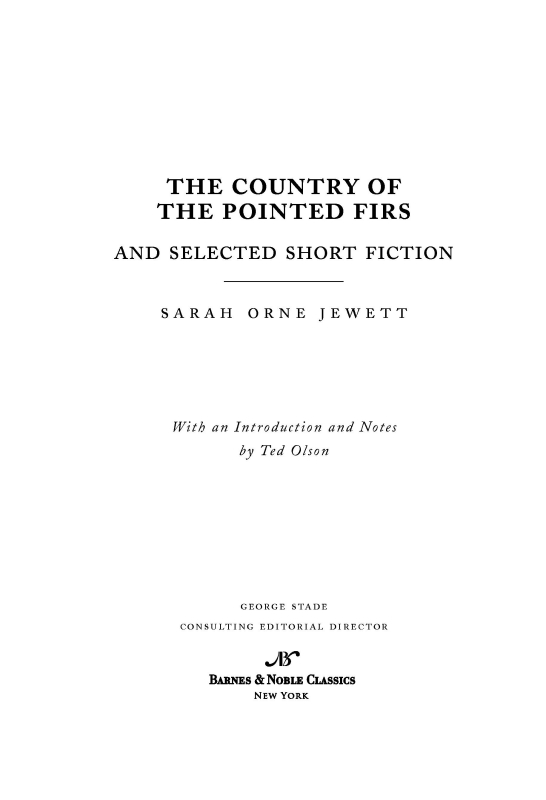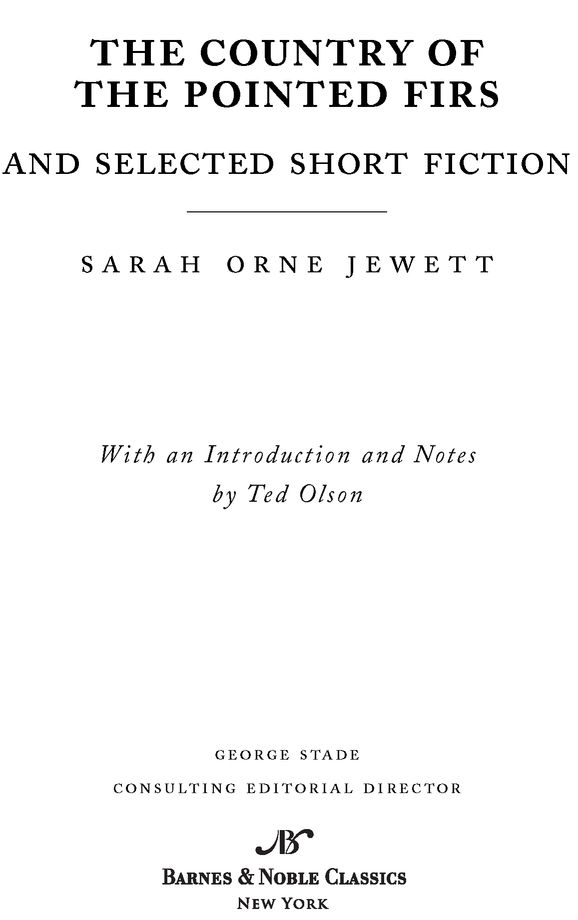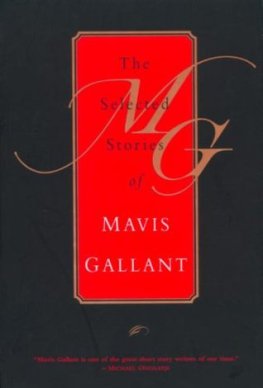
Table of Contents
FROM THE PAGES OF
THE COUNTRY OF THE POINTED FIRS
AND SELECTED SHORT FICTION
We were standing where there was a fine view of the harbor and its long stretches of shore all covered by the great army of the pointed firs, darkly cloaked and standing as if they waited to embark. As we looked far seaward among the outer islands, the trees seemed to march seaward still, going steadily over the heights and down to the waters edge. (from The Country of the Pointed Firs, page 29)
Her hospitality was something exquisite; she had the gift which so many women lack, of being able to make themselves and their houses belong entirely to a guests pleasure,that charming surrender for the moment of themselves and whatever belongs to them.
(from The Country of the Pointed Firs, page 43)
In the life of each of us, I said to myself, there is a place remote and islanded, and given to endless regret or secret happiness.
(from The Country of the Pointed Firs, page 73)
You can never tell beforehand how its goin to be, and t aint worth while to wear a day all out before it comes.
(from The Country of the Pointed Firs, page 76)
The ease that belongs to simplicity is charming enough to make up for whatever a simple life may lack, and the gifts of peace are not for those who live in the thick of battle.
(from The Country of the Pointed Firs, page 111)
So we die before our own eyes; so we see some chapters of our lives come to their natural end.
(from The Country of the Pointed Firs, page 112)
One can never be so certain of good New England weather as in the days when a long easterly storm has blown away the warm late-summer mists, and cooled the air so that however bright the sunshine is by day, the nights come nearer and nearer to frostiness.
(from The Queens Twin, page 123)
So the day did not begin very well, and I began to recognize that it was one of the days when nothing could be done without company.
(from A Dunnet Shepherdess, page 141)
I cant think of anything I should like so much as to find that herons nest. (from A White Heron, page 202)
To be leaders of society in the town of Dulham was as satisfactory to Miss Dobin and Miss Lucinda Dobin as if Dulham were London itself. (from The Dulham Ladies, page 207)
When you remember, in years to come, that I came here to see the old school-house, remember that I said: Wish for the best things, and work hard to win them; try to be good men and women, for the honor of the school and the town, and the noble young country that gave you birth; be kind at home and generous abroad. Remember that I, an old man who had seen much of life, begged you to be brave and good. (from A Native of Winby, page 253)
I can forgive a person, but when Im done with em, Im done.
(from The Guests of Mrs. Timms, page 341)
Being a New Englander, it is natural that I should first speak about the weather. (from The White Rose Road, page 349)

SARAH ORNE JEWETT
Sarah Orne Jewett was born on September 3, 1849, in South Berwick, Maine. Her family lived in a comfortable house next door to her paternal grandparents. From an early age her educated family and especially her father instilled in her a love of literature, and she read widely. Sarahs father, a country doctor, took her in his horse-drawn carriage to see patients, often as an alternative to attending a village school; she also frequently failed to attend school because of recurring bouts of rheumatism. On their trips together Sarahs father taught her to carefully observe the Maine countryside and coastal towns and the country folk who lived there. Sarahs travels with her father and the time she spent listening to the local sailors who swapped stories in her grandfathers general store fed her talent for storytelling; by age eighteen Sarah had published her first piece of fiction, Jenny Garrows Lovers (1868), under the pen name A. C. Eliot. Having received an inheritance from her grandfather, she was free to pursue a writers life without financial worries.
William Dean Howells, then editor of the acclaimed Atlantic Monthly, accepted the story Mr. Bruce in 1869, thereby launching Jewetts career. While in her imagination and writing Jewett may have remained loyal to her native state, her literary circle stretched far beyond the borders of South Berwick and included some of the most distinguished authors of the era. Through Howells, and later her lifelong friend Annie Fields, Jewett came to know such figures as Mark Twain, Matthew Arnold, Harriet Beecher Stowe, Alfred Tennyson, Henry James, and Charles Dickens.
In 1873 the Atlantic Monthly published The Shore House, a sketch about life in the fictional Maine town of Deephaven, which resembled South Berwick. (The magazine first published most of the short works that Jewett later published in book form.) With this sketch Jewett began to find her voice as a local color writerthat is, one who focuses on the unique qualities of a particular region and its people. With Howells editorial guidance, these sketches and others were later collected in Jewetts first book, Deephaven (1877).
Jewett was greatly saddened by her fathers death in 1878 and eventually dedicated two books to him: Country By-Ways (1881), a book of nonfiction sketches, and A Country Doctor (1884), a novel whose main character is based on her father. By the mid-1880s Jewett was producing the work for which she is best known. In 1886 she published A White Heron and Other Stories, a book of short fiction. The title story is one of the most anthologized in America. Her short story collections from this fruitful time include The King of Folly Island, and Other People (1888) and A Native of Winby, and Other Tales (1893).
Jewetts quiet life in South Berwick was often interrupted by travels in America and abroad. She frequently divided her time between her own home and Fieldss residences in Boston and Manchester-by-the-Sea on the Massachusetts coast. She made four major journeys to Europe with Fields, as well as numerous excursions to visit friends in the New England area.
When her masterpiece, The Country of the Pointed Firs, was serialized in the Atlantic Monthly and then published in book form by Houghton Mifflin in 1896, Jewett was at the height of her literary powers. Glowing reviews from the likes of Henry James and Rudyard Kipling and excellent book sales helped cement her reputation as a leading author of the time. In 1900 Jewett received an honorary doctorate from Bowdoin Collegethe first the institution had ever given to a woman.
A carriage accident on her birthday in 1902 left Jewett too physically incapacitated to write, thus effectively ending her literary career. She did, however, maintain her numerous friendships; in her final years she became a mentor to the promising young writer Willa Cather, who was inspired by Jewetts writing. In 1909 Sarah Orne Jewett was partly paralyzed by a stroke but still expressed good spirits and humor in her letters. She died of a second stroke on June 24 in South Berwick.
THE WORLD OF SARAH ORNE JEWETT ANDTHE COUNTRY OF THE POINTED FIRS
Next page









